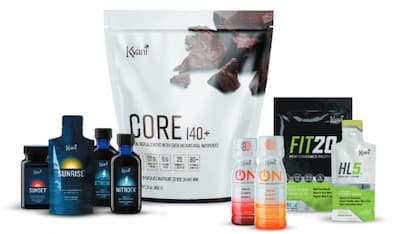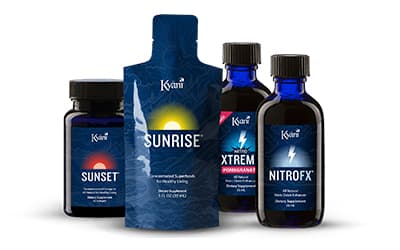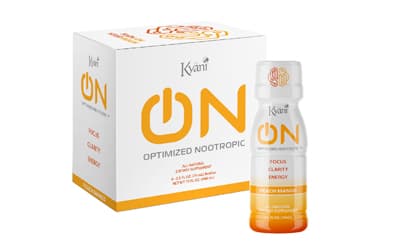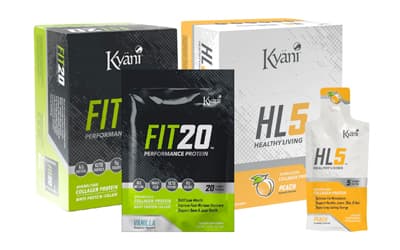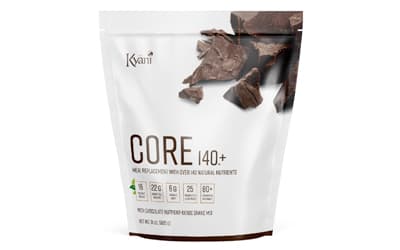Yes, Kyani Origin is a great tasting, plant based protein solution that is viable for many vegans and vegetarians. Obviously, there are independent promoters of the Kyani products, but most people who promote Kyani use it and in this day and age it is pretty difficult to promote products that don't work.
You can check out the Kyani Better Business Bureau profile and read the positive and negative reviews, and see how the company responded.
Pea Protein, Organic Pumpkin Seed Protein, Organic Sunflower Seed Protein, Fava Bean Protein
Chicory Root Inulin, Milled Flaxseed, Cellulose Fiber, Apple Fiber, Bamboo Fiber
* Percent Daily Values are based on a 2,000 calorie diet.
✝ Daily Value (DV) not established.
Other Ingredients: Organic Cane Sugar, Cocoa Processed with Alkali, Natural Flavors, MCT (Medium Chain Triglycerides), Sunflower Oil, Sea Salt, Potassium Citrate, Xanthan Gum, Stevlia Leaf Extract, Sodium Citrate, D-Alpha Tocopheryl Acetate.
Manufactured in a facility that also processes eggs, milk, soy and wheat.
There is no clear cut answer to the question of who takes plant based protein. There are certain benefits to eating plant based protein, but one must also consider the cost of incorporating it into their diet. Many people have concerns about soy and aren't aware of the potential health consequences of soy consumption. However, there are several other factors to consider when determining if a person should eat soy products.
If you're thinking about going vegan, you need to understand that plant based proteins are low in saturated fat and cholesterol. You can choose any kind of protein that will suit your body. For example, pea protein powder is low in cholesterol and has 21 grams of protein per serving. You can add pea protein powder to soups, smoothies, and salads. A good plant-based diet should contain a variety of healthy, high-protein foods.
If you're looking for a way to incorporate more plant-based protein into your diet, meal prep is the best way to ensure that you are getting enough protein. Using a nutrition calculator, you can calculate how much protein you need to eat every day. By putting together all of the different ingredients, you'll be able to create a delicious and nutritious meal. By following these tips, you'll be well on your way to a healthier body and mind.
Plant-based protein is a great way to supplement a diet with a complete source of protein. If you want to eat healthier, you can combine several different sources of protein to ensure that your diet contains the right amount of nutrients for you. If you're looking for a way to make your daily allowance of plant-based proteins, consider a vegan meal plan. A plant-based protein plan can be the best option for you if you're eating a diet rich in animal-based proteins.
A plant-based protein diet is a great choice for those who want to reduce their intake of meat. It can also lower saturated fat and add more nutrients to their diet. If you're not ready to switch to plant-based proteins, try eating a variety of foods. Besides the meat, you can replace it with beans or peanut butter for an extra protein boost. By consuming a range of foods, you can enjoy a broader range of amino acids.
A plant-based protein diet is beneficial to anyone who wants to achieve the right balance of nutrients. This protein is available in a variety of foods, including cereals, vegetables, and nuts. In addition to plant-based proteins, nutritional yeast is a valuable source of vitamin B12. Most of these foods are also rich in fiber. A good source of plant-based protein is essential for a healthy diet. When choosing a vegan diet, it's important to make sure to find a balance of foods high in protein.
If you're wondering why you should use plant-based protein, you may be a bit confused. The most obvious reason is that it takes longer to digest than animal proteins. One of the most important reasons is that fiber is an essential part of the plant-based protein. The fiber helps move food through the digestive system and keeps blood sugar levels in check. In addition, plant-based proteins are low in fat and saturated calories, which makes them a better choice for people with diabetes and other health issues.
Another reason to use plant-based protein is that it is more affordable. Unlike whey proteins, plant-based protein powders contain all the essential amino acids. This means that a high-protein diet can be more sustainable, while also reducing the impact on animals. It is critical to remember that plant-based protein contains less carbohydrate content than animal protein. This is a big advantage when compared to other types of protein.
When consuming plant-based protein, you should look for a plant-based product that is cold-processed. The best way to choose a high-quality powder is one that is organic. This is because it has less pesticides than soy, which may be harmful to the human body. In addition, organic soy proteins are free from hexane, which makes them more affordable. These factors make plant-based protein a great choice for people with allergies and dietary restrictions.
A plant-based protein powder is also healthier for the environment than whey. Several studies have shown that animal-based protein contains more calories than plant-based protein. Therefore, plant-based proteins are a great choice if you want to avoid the health problems that come from meat and dairy products. They are also more environmentally friendly. As a result, they are a better choice for vegetarians and vegans.
Another reason to use plant-based protein is that it is more nutritious. Since it contains fewer calories than animal proteins, plant-based proteins are more easily digested and absorb nutrients more effectively. These benefits are a big reason why vegans and non-vegans should choose plant-based proteins. The protein is highly absorbable and will maintain lean muscle mass. It also has a lower price and is easier to find than animal-based proteins.
Moreover, the protein is more nutritious. Most vegans do not need to eat meat or dairy. A plant-based diet is a better choice. However, vegans can use plant-based protein as well. Many vegans are not satisfied with meat and dairy-based proteins. They are not accustomed to the high fiber content of animal-based products, but they are prone to constipation and gastrointestinal problems.

